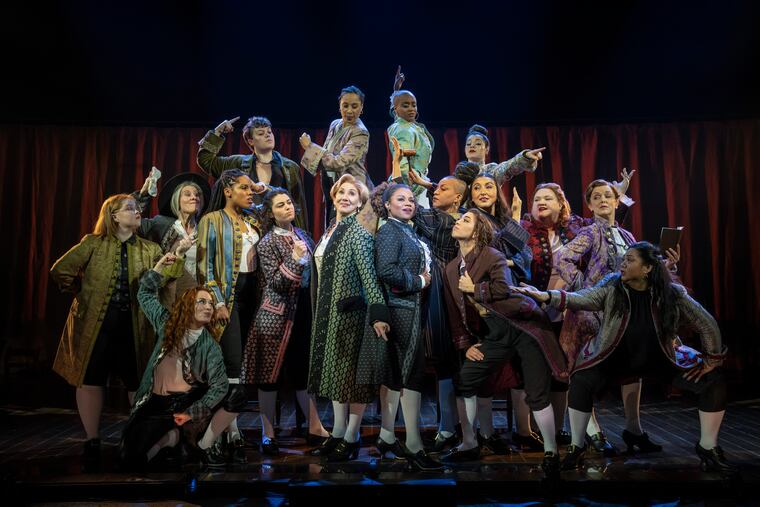Review: ′1776′ is exciting in all its subversive glory. But only in parts.
The musical struggles to maintain the balance between comedy and caricature, but boasts of some excellent performances from its all-female, transgender, and non-binary cast.

Abigail Adams famously admonished her husband, John, to “remember the ladies” in the creation of America. The latest Broadway revival of the Tony Award-winning musical 1776, which kicked off its national tour in Philadelphia and plays the Forrest Theatre through Feb. 26, takes that notion seriously. And literally.
Riffing off the casting innovations of Lin-Manuel Miranda’s Hamilton, this 1776, directed by Diane Paulus and Jeffrey L. Page, populates Peter Stone and Sherman Edwards’ 1969 show with a multiracial ensemble of women and actors who identify as trans or nonbinary.
For the most part, the story and songs, apart from John Clancy’s edgy new orchestrations, remain unchanged. (One meaningful script addition: that Abigail Adams admonition.) Stone’s book is still a stirring (if simplified and partly invented) account of America’s founding here in “foul, fetid” Philadelphia. Edwards’ tunes are melodic and, in this production, often thrillingly performed.
The terrific company is led by Gisela Adisa, a fine singer and stage presence but maybe not quite as obnoxious as John Adams. Joanna Glushak is so charismatic, precise, and convincing as the avatar of conservative cool, Pennsylvania’s John Dickinson, that you might be tempted to switch sides.
Liz Mikel hits all her comic beats as the gouty sage (and inventor of the stove), Ben Franklin. Kassandra Haddock is commanding as South Carolina’s Edward Rutledge, whose insistence on excising an antislavery clause from the Declaration of Independence almost splinters the nascent republic.
This revival’s revisionist conception, which initially seems incoherent, has its payoffs. When Adams, Franklin, and Thomas Jefferson (Nancy Anderson, who really does play the violin) sing of America’s pending birth in “The Egg,” rapid-fire projections (by designer David Bengali) flash forward to centuries of civil-rights protests and expanding opportunities. It’s an exciting moment that seems, at one burst, to illuminate the production’s rationale.
Overall, Paulus and Page lean into the show’s comedic moments, sometimes too far. Page’s choreography in particular seems overly stylized, at times cartoonish. It’s at odds with the intended realism of Stone’s book. Writing in the rebellious 1960s, he sought to humanize the Founding Fathers by playing up their flaws, including stubbornness, indecision, and rampant libido, without falling into caricature. It’s a delicate balance that this revival sometimes loses.
The show pits the claims of liberty against those of property. In the face of the revolutionary zeal of Adams, Jefferson, and others, the more-moneyed delegates of the Second Continental Congress worry about losing what’s theirs.
The South has a more particular concern: its defense of what Rutledge euphemistically calls its “peculiar institution.” Stone and Edwards portray the delegates’ decision to avert their collective gaze from the moral abomination of slavery as the tragic price of bringing the nation into existence. This revival’s gender-bending can be a distraction from that narrative.
This production’s biggest fail comes in what is normally the musical’s climactic (and potentially showstopping) number, “Molasses to Rum.” Haddock does her best, but Rutledge’s indictment of New England’s financial complicity in the purchase and trade of human beings requires a powerful baritone. Page’s busy choreography, Jen Schriever’s lighting design, and Clancy’s amped-up orchestration can’t disguise that fact.
More successful is the show’s closing sequence, in which the actors, costumed by Emilio Sosa, return to contemporary dress and extend the tailcoats of the founders to the audience. It’s our invitation to reimagine and reshape the American future.
―
“1776.” Presented by the Kimmel Cultural Campus and the Shubert Organization through Feb. 26 at the Forrest Theatre, 1114 Walnut St. Tickets: $58-$158.50. Information: 212-239-6200 or www.telecharge.com.